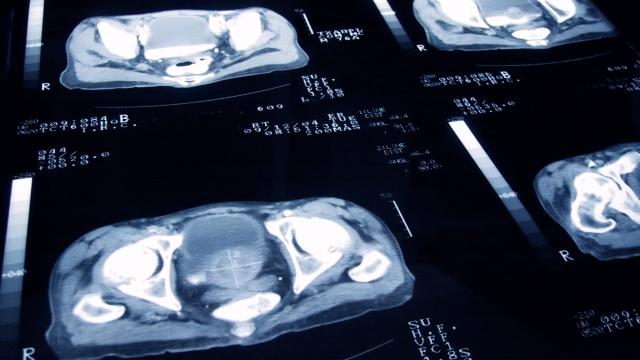
Prostate imaging
Patients with high-risk localized prostate cancer may be eligible to participate in a new clinical trial at the NIH Clinical Center.
Many men with prostate cancer are diagnosed at an early stage of the disease when the cancer is confined to the prostate. However, about 20 percent are diagnosed with high-risk disease, which tends to spread, or metastasize, to other parts of the body. Conventional imaging may not detect all areas of metastasis. William Dahut, M.D., Senior Investigator in the Genitourinary Malignancies Branch, is leading a study using positron emission tomography/computed tomography (PET/CT) with radioactive material (18F-DCFPyL) to try and identify places in the body where prostate cancer has spread.
A CT scan uses x-rays and a computer to produce a 3-dimensional image of the body. A PET scan uses radioactive material (18F-DCFPyL), known as a radiotracer, injected into the blood to show the internal workings and structures of the body. The 18F-DCFPyl radiotracer binds to prostate-specific membrane antigen (PSMA). PSMA, a protein commonly expressed in prostate cancer tumors, fuels the development of prostate cancer cells. 18F-DCFPyL will be given by injection before the patient has a whole-body PET/CT scan. The combined scan with 18F-DCFPyl radiotracer may help pinpoint prostate cancer that has spread. The goal of the study is to see if patients whose pre-surgery 18F-DCFPyLPET/CT scan shows no disease spread have a better outcome than patients who have not had this type of imaging and whose metastases may thus have gone undetected.
Clinicaltrials.gov identifier: NCT03976843
NCI Protocol ID: NCI-19-C-0104
Official Title: A Phase II Multi-Institutional Trial to Evaluate Prostate Specific Membrane Antigen (PMSA)-Based PET Imaging of High-Risk Prostate Cancer`
The Center for Cancer Research is NCI’s internal cancer center, a publicly funded organization working to improve the lives of cancer patients by solving important, challenging and neglected problems in cancer research and patient care. Highly trained physician-scientists develop and carry out clinical trials to create the medicines of tomorrow treating patients at the world’s largest dedicated research hospital on the campus of the National Institutes of Health in Bethesda, Maryland.
For more information on CCR clinical trials click here, and subscribe to have the latest CCR clinical trials sent directly to your inbox.
This trial is now being led by Fatima Karzai, M.D., Senior Clinician in the Genitourinary Malignancies Branch.


